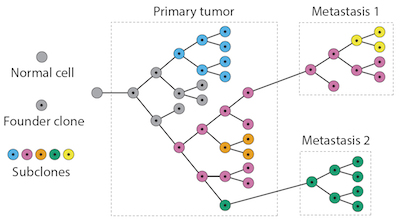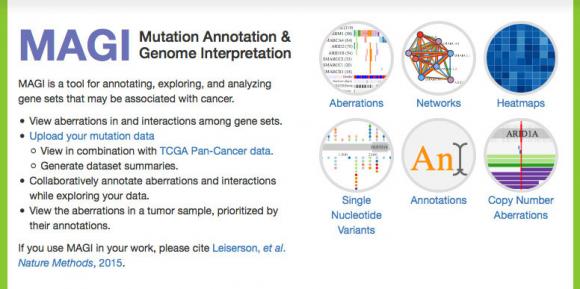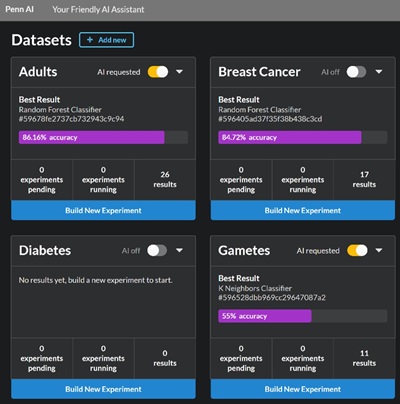 The University of Minnesota is expanding access to clinical trials and supporting the health research community by sharing its clinical trial resource, StudyFinder, with other institutions designated with Clinical and Translational Science Awards (CTSA), a program spearheaded by the National Institutes of Health (NIH). StudyFinder is an online tool pooling clinical trials and research studies in one space, with easy-to-understand language and functions. It helps patients and healthy volunteers get involved and allows researchers to publicize their clinical trials and connect with study volunteers.
The University of Minnesota is expanding access to clinical trials and supporting the health research community by sharing its clinical trial resource, StudyFinder, with other institutions designated with Clinical and Translational Science Awards (CTSA), a program spearheaded by the National Institutes of Health (NIH). StudyFinder is an online tool pooling clinical trials and research studies in one space, with easy-to-understand language and functions. It helps patients and healthy volunteers get involved and allows researchers to publicize their clinical trials and connect with study volunteers.
National Institutes of Health (NIH)
See the following -
Open Access To Be Celebrated Next Week [Washington University]
The Washington University Faculty Senate recently adopted a formal open access resolution that places renewed focus on the dissemination of new knowledge and asks WUSTL faculty to seek out publishers that share a vision of broad digital access to scholarly information. Read More »
- Login to post comments
Open Access Week At Harvard, October 22 - 28, 2012: Celebrating Open Access Worldwide
Today marks the beginning of Open Access Week, a six-day celebration and reflection on the global movement to promote “the free, immediate, online access to the results of scholarly research, and the right to use and re-use those results as you need.” Read More »
- Login to post comments
Open Access: Four Ways It Could Enhance Academic Freedom
The power of funding alone should not be enough to override academic freedom, argues Curt Rice, nor does open access automatically skew the world of scholarship Read More »
- Login to post comments
Open Access: Six Myths To Put To Rest
Open access to academic research has never been a hotter topic. But it's still held back by myths and misunderstandings repeated by people who should know better. The good news is that open access has been successful enough to attract comment from beyond its circle of pioneers and experts. The bad news is that a disappointing number of policy-makers, journalists and academics opine in public without doing their homework. Read More »
- Login to post comments
Open Sesame: Academic Publishing
When research is funded by the taxpayer or by charities, the results should be available to all without charge
- Login to post comments
Open Source 3-D Bioprinting Brings Houston Team One Step Closer to Growing Capillaries
 In their work toward 3-D printing transplantable tissues and organs, bioengineers and scientists from Rice University and Baylor College of Medicine have demonstrated a key step on the path to generate implantable tissues with functioning capillaries. In a paper published online in the journal Biomaterials Science, a team from the laboratories of Rice bioengineer Jordan Miller and Baylor College of Medicine biophysicist Mary Dickinson showed how to use a combination of human endothelial cells and mesenchymal stem cells to initiate a process called tubulogenesis that is crucial to the formation of blood-transporting capillaries...
In their work toward 3-D printing transplantable tissues and organs, bioengineers and scientists from Rice University and Baylor College of Medicine have demonstrated a key step on the path to generate implantable tissues with functioning capillaries. In a paper published online in the journal Biomaterials Science, a team from the laboratories of Rice bioengineer Jordan Miller and Baylor College of Medicine biophysicist Mary Dickinson showed how to use a combination of human endothelial cells and mesenchymal stem cells to initiate a process called tubulogenesis that is crucial to the formation of blood-transporting capillaries...
- Login to post comments
Open Source Penn Software Helps to Identify Course of Cancer Metastasis, Tumor "Evolution"
 Researchers have come to realize that cancer is a disease driven by the same “survival of the fitter” forces that Darwin proposed drove the evolution of life on Earth. In the case of tumors, however, individual cells are constantly evolving as a tumor’s stage advances. Mobile cancer cells causing metastasis are a deadly outcome of this process. Tumors also differ among patients with the same type of cancer, so how is a physician able to prescribe a tailored regimen for the patient? To start to address this conundrum, an interdisciplinary team from the Perelman School of Medicine and the Wharton School at the University of Pennsylvania developed Canopy...
Researchers have come to realize that cancer is a disease driven by the same “survival of the fitter” forces that Darwin proposed drove the evolution of life on Earth. In the case of tumors, however, individual cells are constantly evolving as a tumor’s stage advances. Mobile cancer cells causing metastasis are a deadly outcome of this process. Tumors also differ among patients with the same type of cancer, so how is a physician able to prescribe a tailored regimen for the patient? To start to address this conundrum, an interdisciplinary team from the Perelman School of Medicine and the Wharton School at the University of Pennsylvania developed Canopy...
- Login to post comments
Open Source Web App Helps Researchers Explore Cancer Genetics
 Brown University computer scientists have developed a new interactive tool to help researchers and clinicians explore the genetic underpinnings of cancer. The tool — dubbed MAGI, for Mutation Annotation and Genome Interpretation — is an open-source web application that enables users to search, visualize, and annotate large public cancer genetics datasets, including data from The Cancer Genome Atlas (TCGA) project. “The main motivation for MAGI has been to reduce the computational burden required for researchers or doctors to explore and annotate cancer genomics data,” said Max Leiserson, a Ph.D. student at Brown who led the development of the tool.
Brown University computer scientists have developed a new interactive tool to help researchers and clinicians explore the genetic underpinnings of cancer. The tool — dubbed MAGI, for Mutation Annotation and Genome Interpretation — is an open-source web application that enables users to search, visualize, and annotate large public cancer genetics datasets, including data from The Cancer Genome Atlas (TCGA) project. “The main motivation for MAGI has been to reduce the computational burden required for researchers or doctors to explore and annotate cancer genomics data,” said Max Leiserson, a Ph.D. student at Brown who led the development of the tool.
- Login to post comments
Open, Sesame
If in 2004, Nucleic Acids Research made an overnight switch from being a subscription-based journal to an open access (OA) one, 10 years later high-energy physics as a field will make such a shift when nearly 90 per cent of papers published in a dozen journals will become freely accessible. Read More »
- Login to post comments
Open-source Code Leads to the Adoption of University of Minnesota's StudyFinder by Additional Translational Medicine Research Institutions
- Login to post comments
Opinion: Academic Publishing Is Broken
Academic publishers are currently up in arms about the Federal Research Public Access Act (FRPAA)—a bill that has the perfectly reasonable goal of making publicly funded research available to the public that funded it. Read More »
- Login to post comments
Overview of Major eClinical Trends and Clinical Research
 Clinical research is well on its way to transforming its paper-driven model to an all things electronic format. During the past year, the clinical trial industry has made considerable progress in adopting technology as a way to streamline data collection, transmission, and monitoring. This article focuses on the top eClinical trends of 2015 and beyond. Among the latest developments- adoption rates are higher for electronic data capture (EDC), electronic source data (eSource), and eClinical integration, as the focus is now on capturing real-time data as a continuous stream. These trends are partially the result of high-tech devices, sensors and wearables entering the clinical trial industry, as well as the FDA embracing technology and opening up a dialogue with experts on how to best channel this revolution in order to advance clinical research.
Clinical research is well on its way to transforming its paper-driven model to an all things electronic format. During the past year, the clinical trial industry has made considerable progress in adopting technology as a way to streamline data collection, transmission, and monitoring. This article focuses on the top eClinical trends of 2015 and beyond. Among the latest developments- adoption rates are higher for electronic data capture (EDC), electronic source data (eSource), and eClinical integration, as the focus is now on capturing real-time data as a continuous stream. These trends are partially the result of high-tech devices, sensors and wearables entering the clinical trial industry, as well as the FDA embracing technology and opening up a dialogue with experts on how to best channel this revolution in order to advance clinical research.
- Login to post comments
Penn Medicine Launches First Apple ResearchKit App for Sarcoidosis Patients
 Penn Medicine today launched its first Apple ResearchKit app, focused on patients with sarcoidosis, an inflammatory condition that can affect the lungs, skin, eyes, heart, brain, and other organs. The effort marks Penn’s first time using modules from Apple’s ResearchKit framework, as part of the institution’s focus on mobile health and innovative research strategies. ResearchKit is an open source software framework designed specifically for medical research that helps doctors and scientists gather data more frequently and more accurately from participants using an iPhone...
Penn Medicine today launched its first Apple ResearchKit app, focused on patients with sarcoidosis, an inflammatory condition that can affect the lungs, skin, eyes, heart, brain, and other organs. The effort marks Penn’s first time using modules from Apple’s ResearchKit framework, as part of the institution’s focus on mobile health and innovative research strategies. ResearchKit is an open source software framework designed specifically for medical research that helps doctors and scientists gather data more frequently and more accurately from participants using an iPhone...
- Login to post comments
Penn Medicine Releases Open Source, 'Self-Service' Artificial Intelligence Tool for Data Analytics
 The Penn Medicine Institute for Biomedical Informatics has launched a free, open-source automated machine learning system for data analysis that is designed for anyone to use, from a high school student looking to gain insight on their baseball team's statistics, to trained researchers looking for associations between cancer and environmental factors. "Penn AI," the first widely available tool of its kind, seeks to lower the barrier for entry into artificial intelligence, allowing users to bring in their own datasets or use the several hundred that are available for download within the tool. With a user-friendly dashboard easily run on a laptop, Penn AI is also designed to learn as it goes, ultimately making analysis suggestions based on the "experience" it gains through use.
The Penn Medicine Institute for Biomedical Informatics has launched a free, open-source automated machine learning system for data analysis that is designed for anyone to use, from a high school student looking to gain insight on their baseball team's statistics, to trained researchers looking for associations between cancer and environmental factors. "Penn AI," the first widely available tool of its kind, seeks to lower the barrier for entry into artificial intelligence, allowing users to bring in their own datasets or use the several hundred that are available for download within the tool. With a user-friendly dashboard easily run on a laptop, Penn AI is also designed to learn as it goes, ultimately making analysis suggestions based on the "experience" it gains through use.
- Login to post comments
Philippines National Telehealth Center Leverages Innovative Open Solutions to Provide Equitable Access to Quality Healthcare
 OpenGov had the opportunity to speak to Dr. Portia Grace Fernandez-Marcelo, Director of the UP (University of Philippines) Manila-National Telehealth Center (NTHC) about using ICT to provide equitable access to quality healthcare for all, specially in isolated and disadvantaged communities. NTHC is one of the pioneers in the Philippines developing cost-effective ICT tools and innovations for improving healthcare and deploying solutions in communities where they are required most urgently...
OpenGov had the opportunity to speak to Dr. Portia Grace Fernandez-Marcelo, Director of the UP (University of Philippines) Manila-National Telehealth Center (NTHC) about using ICT to provide equitable access to quality healthcare for all, specially in isolated and disadvantaged communities. NTHC is one of the pioneers in the Philippines developing cost-effective ICT tools and innovations for improving healthcare and deploying solutions in communities where they are required most urgently...
- Login to post comments